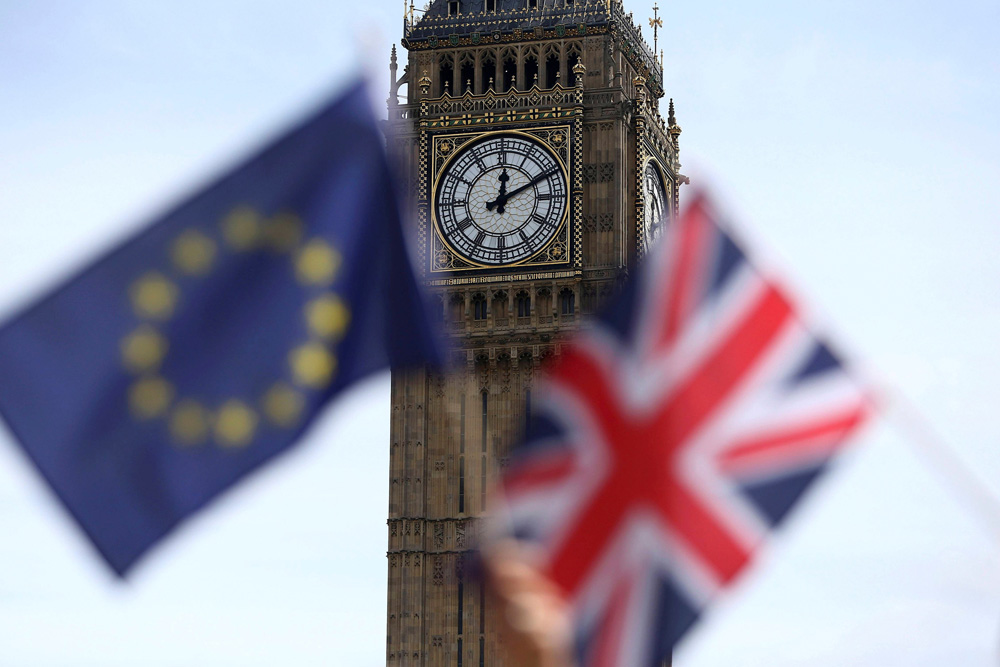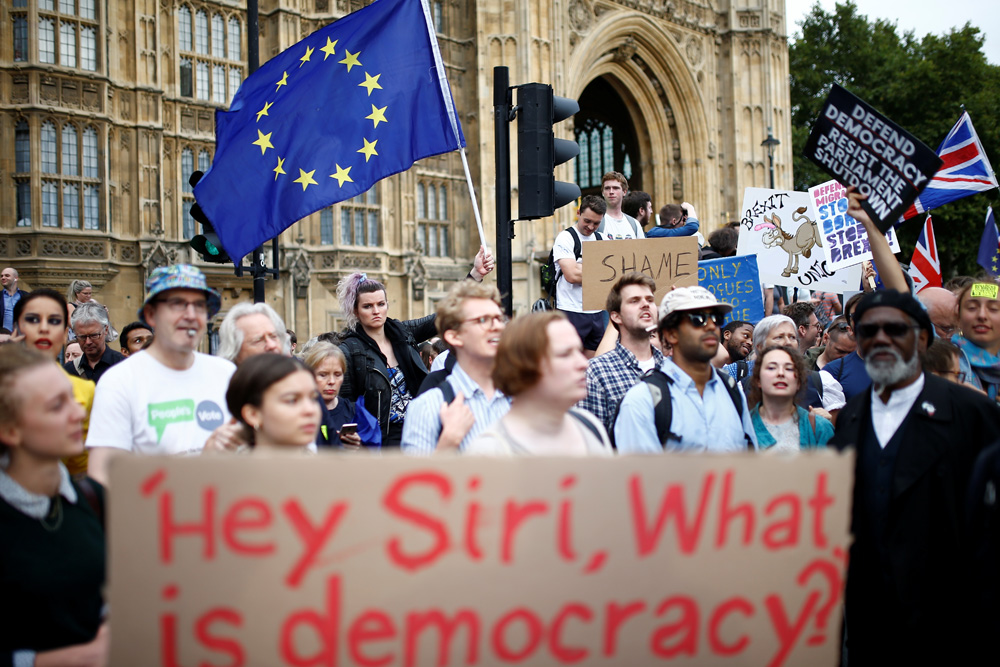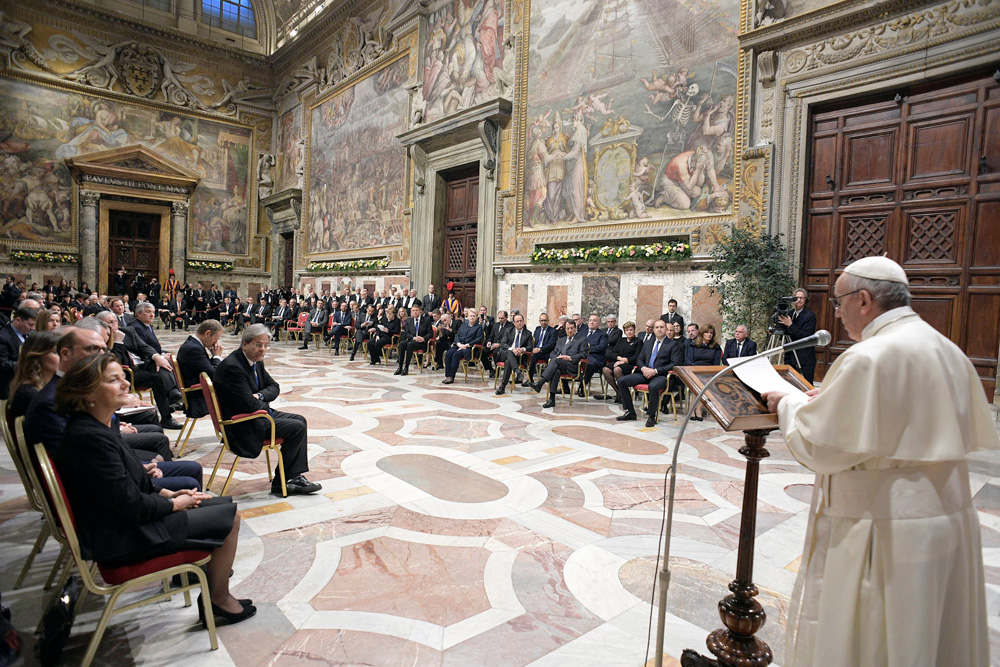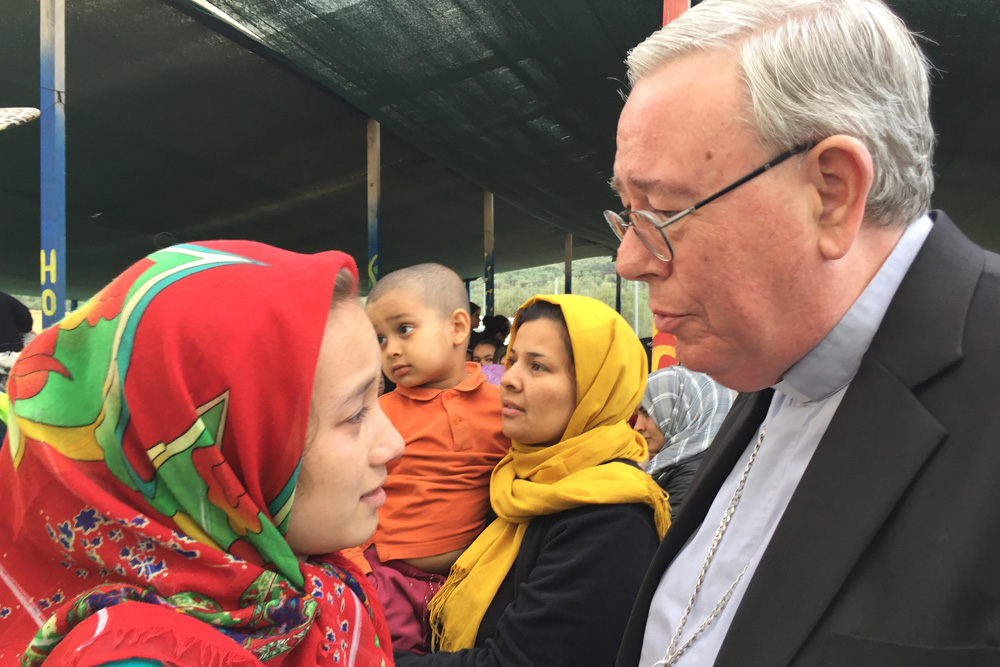
A European Union flag and British Union flag are seen June 19, 2016, at Parliament Square in London. Voters in the United Kingdom voted June 23, 2016, to leave the European Union. (CNS/Neil Hall, Reuters)
When a new European Commission takes over this fall under German President-elect Ursula von der Leyen, it will make fresh attempts to tackle the multiple crises plaguing the world's largest trading bloc.
Significantly, it will also coincide with the United Kingdom's planned departure on Oct. 31, after a bitter, prolonged wrangle that has raised fundamental questions over the European Union's future direction. As moral guarantor of a united Europe, the Catholic Church will be following developments closely, doing what it can to ease tensions and foster new hopes.
"The church's contribution to current EU challenges is mostly to give voice to human dignity, to the poor, to care for our environment — as well as to those values we consider to be at the heart of the European project with roots in the Christian humanistic tradition," explained Fr. Manuel Barrios Prieto, Spanish secretary-general of COMECE, the Brussels-based organization representing the bishops' conferences of the EU. "We're hoping the new commission will be close to the EU citizens and take effective action on issues really important for them, keeping in mind the values that form the essence of Europe. Our first impression is very positive."

Brexit protesters hold placards and a flag of the European Union outside the Houses of Parliament in London Aug. 28. (CNS/Henry Nicholls, Reuters)
In elections to the European Parliament last May, two basic groupings who've dominated for decades — the center-right European People's Party, headed by Germany's Manfred Weber, and center-left Progressive Alliance of Socialists and Democrats led by Dutch Frans Timmermans — narrowly kept their lead, taking 336 of the parliament's 751 seats between them.
But this was well down on their showing at the last elections in 2014, when the parliament's composition was also shaken up in a search for new faces and ideas.
Instead, the gap was filled by more radical parties, from ecologists to nationalists, who've steadily gained ground across the EU's 28 member-states. Though decried as populists by their opponents, they insist they're giving a voice to underrepresented social groups, and addressing pent-up frustrations among the EU's over 512 million citizens.
In June, a far-right coalition, Identity and Democracy, was set up by under the guidance of Italian far-right leader Matteo Salvini from Italy's Northern League, bringing in France's National Rally, Austria's Freedom Party and the German Alternative for Germany, and listing enhanced security, combating EU bureaucracy and curbing immigration among its core priorities.
With 73 members, Identity and Democracy is now the European Parliament's fifth largest political grouping, just behind the Greens/European Free Alliance — which represents stateless nations, minority interests and pro-independence movements from Scotland to Catalonia; the Greens/EFA has also made big gains.
Groups like this were bitterly disappointed when von der Leyen, a former defense minister, was chosen by heads of government to succeed Jean-Claude Juncker as European Commission president. Von der Leyen will be the first woman to hold the powerful post. But many politicians have complained about a lack of democracy and transparency surrounding her appointment.
Anxieties have also remained acute about the EU's trouble-prone euro currency and the continued influx of refugees and migrants, as well as over Britain's protracted decision to leave.
Although the country's 73 newly elected members took their seats when the parliament opened on July 2, members of the dominant Brexit Party ostentatiously turned their backs when the EU's anthem, Beethoven's "Ode to Joy," was played at the inauguration ceremony.
For Catholic bishops seeking a prudent response to the complex dramas, these are challenging times. But some guidance at least has come from the pope.

Pope Francis speaks during the European Union summit at the Vatican March 24, 2017. (CNS/L'Osservatore Romano via Reuters)
In November 2014, when Pope Francis addressed the European Parliament, he regretted the "great ideas" which once inspired Europe had been "replaced by the bureaucratic technicalities of its institutions," and raised eyebrows by comparing the modern-day Europe to "a grandmother, no longer fertile and vibrant."
He accused EU leaders of "laying down rules perceived as insensitive to individual peoples, if not downright harmful," and cautioned of a growing mistrust towards the bloc's "institutions considered to be aloof."
Since then, Francis modified his tone, turning his attention instead on forces undermining the continent's unity.
Returning from Romania in June, he again reprimanded the "aged" European Union for abandoning "the goal of working together," and urged its inhabitants to learn from history and not be "overcome by pessimism."
"Europe is not being attacked by cannons or bombs in this moment, but by ideologies," Francis added, "ideologies that are not European, but which come from outside or stem from small groups."
Interviewed in early August by Italy's La Stampa daily, the pontiff denounced populism and "sovereignism," and urged Europe to relaunch itself through "dialogue." Flying back from Madagascar on Sept. 10, he condemned the "human disease" of "xenophobia" and warned that some political speeches in Europe had begun to resemble those of Adolf Hitler.
When the pope named 13 new cardinals on Sept. 1, his inclusion of Archbishop Jean-Claude Hollerich of Luxembourg was widely seen as a ringing endorsement of the EU and its supporters.
As president of COMECE, the EU bishops' commission, Hollerich has urged EU reforms and a greater openness to dialogue, while also backing EU institutions and arguing for closer integration.
COMECE was founded in 1980, and has steadily built up its profile with regular statements and reports, making the most of Article 17 of the 2007 Lisbon Treaty, which requires EU officials to maintain "an open, transparent and regular dialogue" with churches.
"That Pope Francis is creating Archbishop Hollerich a cardinal is a sign of the importance he gives to COMECE and its mission," Barrios Prieto told NCR. "This certainly manifests the importance the church gives to its presence and mission in Europe, even if this doesn't depend so much on persons but on the truth of its message."
Having also been president of the Conference of European Justice and Peace Commissions, Hollerich is one of the EU's foremost Catholic prelates.
Writing last April in the Rome-based Jesuit periodical, La Civilta Cattolica, he warned that populist politicians were playing "an ignoble game" with public anxieties by inciting aggression against minorities and providing "gateways for new totalitarianisms." They were typified, he added, by U.S. President Donald Trump's former strategist, Steve Bannon, who evoked "a false pseudo-religious and pseudo-mystical world, denying the heart of western theology which is God's love and love of neighbor."

Archbishop Jean-Claude Hollerich of Luxembourg speaks with a refugee May 8 at an activity center for migrants and refugees near Moria on the island of Lesbos, Greece, , 2019. The archbishop urged Catholics to vote for members of the European Parliament who would strengthen the EU's ability to promote and protect human rights. (CNS/Cindy Wooden)
In July, Hollerich told Germany's Catholic News Agency, KNA, he was confident von der Leyen, the new European Commission president, was "the right person" to push forward a positive agenda. In September, he assured Italy's Servizio Informazione Religiosa that, for all his disdain for "unbridled capitalism," the pope saw the EU as "important for the stability of peace in the world."
Roger Nilles, who speaks for Hollerich's Luxembourg Archdiocese, concurs that the cardinal-designate has closely echoed the pope's views of EU-related issues.
"This is a true European, who can articulate the Catholic Church's message to Europe with a clear voice," Nilles told NCR. "Coming from Luxembourg, he sees the EU as a vital peace project, tackling international questions which can't be resolved regionally or nationally. With his appointment, the pope seeks to encourage and open doors for those working in the same direction."
Not everyone has been happy with this glowing endorsement of EU aims; and some question whether Hollerich and COMECE properly represent the range of convictions among Europe's Catholics.
Small states like Luxembourg and Belgium, with multiethnic, multicultural societies and traditions of cautious diplomacy towards their large neighbors, naturally harbor quite different perspectives than countries on Europe's periphery, whose historical and national identities often find stronger expression.
Msgr. Piotr Mazurkiewicz, a Polish theologian and political scientist who served as COMECE's secretary-general in 2008-2012, has warned against identifying the church too closely with the EU.
During an NCR interview last May, he accused COMECE of resorting to "EU jargon," and called for greater weight to be given to the views of national bishops' conferences.
More recently he warned Poland's bishops of an increasing intolerance towards national differences, and accused the outgoing EU Commission, headed by Luxembourg's Jean-Claude Juncker, of pressuring the church to ensure aspects of its canon law conformed with EU standards.

A woman holds a placard during a demonstration called "No fascism in Belgium or in Europe!" May 28 outside the European Parliament in Brussels. (CNS/Piroschka van de Wouw, Reuters)
"There's clearly a desire by the political community to rebuild the church from the outside — although religion will still be needed to legitimize European integration, it won't be allowed to make any serious criticism," Mazurkiewicz told his bishops' conference. "When the state no longer faces any countervailing power in the shape of the church, we see a re-sacralization of the temporal power, which can now adopt any law, such as on gender differences or the redefinition of marriage, in line with its own procedures with no possibility of appeal or revision."
The Christian faith had always suffered, Mazurkiewicz added, when church leaders accepted and became dependent on state patronage. It would be especially damaging in the present context, when attempts were being made "to delegitimize the whole legacy of Christian humanism" in favor of "liberal secularized models."
Whatever the rights and wrongs of COMECE's stance, the depth of current differences may explain why the Catholic Church in the UK has been especially cautious, as disputes over Brexit plunged the country into ever deeper crisis.
In the run-up to fateful June 2016 referendum, when citizens narrowly voted to leave the EU by 51.89% to 48.11%, Britain's Catholic churches avoided any collective position, seeking an uneasy balance instead between defending national self-determination and upholding traditional Catholic support for European unity.
Unlike their counterparts elsewhere, most bishops declined to view EU membership as a historic moral imperative, believing Britain could also find ways of prospering outside.
While Cardinal Vincent Nichols of Westminster warned of the "complex problems" certain to follow a Brexit vote, Archbishop Peter Smith of Southwark told Vatican Radio the EU had become "extremely bureaucratic" in its drive for closer integration.
In the three years since, as deadlock deepened over the British government's failure to gain parliamentary support for a Brexit deal, the Catholic bishops similarly avoided any attempt at a collective stance, intervening only with calls for EU residents in Britain to be offered settled status.
While bishops in neighboring Ireland expressed fears for peace if issues around Brexit were left unresolved, their British counterparts remained silent. And when Britain's official Anglican Church and other non-Catholic denominations condemned the controversial proroguing of parliament in late August, they also withheld official comment.
A spokesperson for the bishop's conference was not immediately available for comment. However, in a rare remark to Poland's Catholic Information Agency, or KAI, on Oct. 5, Nichols confirmed his bishops' conference had "taken no position" on the "very complex challenge" of Brexit.*
"All I can say is that Brexit concerns our ties with European institutions, not with Europe as such," the cardinal added. "As a church, we are a full part of the Catholic church in Europe and will remain so, whatever happens."
Amid mounting acrimony and exasperation, some Catholics think better guidance should be offered.
The interminable squabbling has compromised the UK's image in the world, and highlighted the grave problems likely to face other countries if they seek to leave.
But the crisis has also raised profound questions about the EU — whether it truly remains a voluntary association of sovereign countries working for common aims and values, or has instead become a centrally directed power bloc, accumulating ever greater control.
"Much of what we see in our country because of Brexit is about corporate, social and structural sin, linked to sinfulness in the hearts of men and women," theologian Fr. Ashley Beck told Britain's Catholic Theological Association in early September. "And so it is that as the country faces what is surely the most serious moral and political crisis since the Second World War, and when many of our own people and others are seeking moral leadership, the churches seem to have virtually nothing to say."
While Brexit, when it eventually happens, will cut the EU's size for the first time, it also looks set to enhance its Catholic make-up, leaving Catholics making up a clear majority of the overall population. This could give the church greater leverage with policymakers.
"The Catholic Church's voice will clearly be crucial in the years ahead — it's already being canvassed on all sides, and this can only increase," Nilles told NCR. "But it has to serve as a moderator, avoiding identification with left or right, and discerning what that church voice should say between all the different conservative and liberal tendencies."
Just how well the church is currently doing this is open to question.
Advertisement
Barely 50% of EU citizens bothered to vote in elections last May to the European Parliament, where some of the UK's 73 seats are to be reallocated after Brexit, cutting the Parliament's membership to 705.
From his nearby headquarters, Barrios Prieto says his Catholic commission will continue bringing "the church's voice to the work of European institutions," and ensuring human dignity is respected at a time of institutional and economic challenges.
He's also pledged to respect the Brexit vote, while expressing sadness and hoping for "good and collaborative relations" into the future. Although no longer part of the EU, the Spanish priest points out, the UK "will always be European."
"The church is universal and therefore rich in diversity. Each bishops' conference is characterized by a specific history and specific sensitivities on different issues," Barrios Prieto told NCR. "They're all represented at our own meetings through delegated bishops, and this is very enriching for our debates. Dialogue and collegiality are essential. And when it comes to Europe, the church itself pursues unity in diversity."
[Jonathan Luxmoore covers church news from Oxford, England, and Warsaw, Poland. The God of the Gulag is his two-volume study of communist-era martyrs, published by Gracewing in 2016.]
*Editor's note: This story was updated Oct. 7 at 11:45 a.m. CST to include a remark from Cardinal Vincent Nichols.





